- Home
- Joy Fielding
See Jane Run Page 23
See Jane Run Read online
Page 23
“I did not! I told him that if he ever left his garbage can in front of our house again, he’d find it all over his front lawn the next morning!”
“Good for you,” Michael said.
“Of course, it’s not quite in Jane’s league ….”
“What do you mean?” Jane asked, gripping the sides of the dining room table, seeing two Sarahs instead of one.
“You would have called him a Nazi asshole and emptied the trashcan over his head,” Peter told her, as Sarah and Michael laughed in agreement.
Jane heard their laughter as if she were underwater and they were on a distant shore. She tried to swim toward them, to find the top of the water, to break through to its surface, to breathe some air into her lungs. But her efforts only carried her farther down into the abyss. She was drowning, and no one knew. No one could save her.
What could be making her feel this way? She had eaten only what everyone else had eaten. She had opened the bottle of ginger ale herself, had poured her own glass. She had never let the glass out of her hand except when Peter refilled it for her, and even then, she had watched him closely.
No, that was incorrect, she realized with a start. She had put the glass down when she went to answer the door! Michael would have had just enough time to put something in her drink when she was saying hello to Sarah and Peter. Had he? Dear God, had he?
“Sarah, you have to help me …” Jane heard the words as if they were coming from someone else’s mouth, watched herself collapse on the floor, Michael and Paula and Sarah and Peter rushing to her side, Michael lifting her up and carrying her up the stairs to her room, Sarah and Peter right behind.
“Goddamnit, Michael, are you going to tell me what’s going on?” Sarah demanded.
Jane tried to open her eyes, but it was almost as if they had been glued shut. She fought to remain conscious, heard the sound of crying, recognized the pain as Michael’s. “I wish to God I knew,” he was sobbing softly. “You have no idea what’s been going on around here. …”
“Tell us.”
“Jane is having some kind of breakdown.” His voice was hoarse, incredulous.
“That’s impossible.”
Even with her eyes closed, Jane knew everyone was looking at her.
“She doesn’t remember who she is; she says she can’t remember anything about our life together….”
“But that’s absurd. She remembered us!” Peter sputtered.
“Well, no, not really,” Sarah corrected him. “I mean, she didn’t remember anything about Hitler. You could see that. At least I could.”
What else can you see? Jane asked, pleading through closed lids for Sarah to come to her rescue.
“She was very strange on the phone this afternoon. And I said she didn’t look right the minute we walked in the door. Is she on some sort of medication?”
“Her doctor prescribed a mild tranquilizer, but she’s refusing to take it. She says she doesn’t like the way it makes her feel. I don’t know what to do anymore,” Michael continued. “You don’t know what it’s been like. Her behavior has been so erratic. One minute she’s up, the next minute, she’s down. She’s as docile as a kitten in the morning, and by afternoon, she’s a raving lunatic, pulling everything out of her closet and stomping on it. I never know what she’s going to do or say next.”
“How long has this been going on?”
“At least a month.”
“She was like this in California?”
“She never went to California.”
Jane heard Sarah gasp.
“Actually, it’s been going on a lot longer than a month. She’s never really been the same since the accident. I guess it was too much to hope for ….”
“But she seemed to be doing very well. There were never any signs—”
“In public, no. When we’d go out, she’d make an effort. I don’t know. Maybe the effort got to be too much. Suddenly, she just walked away from everything. The doctors are calling it a hysterical fugue state.”
“I don’t believe this.”
“She’ll get better again, won’t she?”
“They thought she’d be better by now, but she’s only getting worse. This afternoon, she pulled a knife on Paula.”
“A knife!”
“Good God!”
“I don’t know what to do. What happens if the next time she does something like that, she actually hurts someone? What happens if she hurts herself?”
“She wouldn’t do that.”
“Can I take that chance?”
“What are you saying?”
“I don’t know. I don’t know what I’m saying anymore. I don’t know if I’m coming or going anymore. She gets so depressed, and she won’t let me help her. And I’m scared because every time I go out the door I worry that she might not be here when I get back, that she might try to … I don’t even want to say it.”
“Jane is not the kind of person to kill herself,” Sarah said forcefully, giving voice to Michael’s concerns.
“Was that Jane at dinner tonight?” he asked simply.
The question silenced her, brought stillness to the room.
“If she doesn’t get better soon,” Michael began, his breathing heavy, his voice low, “then I might have to think about having her committed.”
“Michael, no!”
“What other choice do I have? Tell me, Sarah. You tell me what to do and I’ll do it. I’m at my wits’ end. I’ve tried everything I know how. I don’t know what else to do. I just don’t know what other choice I have.”
Oh, God, Jane thought, as darkness crept through her, somebody please help me.
NINETEEN
SHE dreamed that Emily had phoned and asked to meet her at Boston Harbor. But when she got there, Emily had already left, and so Jane ran feverishly along the Charles River, past the rows of sightseeing boats and the New England Aquarium, the wharfs and the Coast Guard piers, across the Charlestown Bridge, past the tour groups gathered around the U.S.S. Constitution, toward the Boston Navy Yard. She raced toward the dock just as Emily’s ship was pulling out. “Emily! Emily!”
“I’m afraid you’re not with this tour,” a young woman said, her voice full of reproach. “You’ll have to pick up another tour at the Boston Common. Emily will meet you there.”
“Emily!” Jane called, tripping over the grave of Mother Goose in the old Granary Burying Ground. “Emily, where are you?”
“You just missed her,” someone said. “She left with Gargamella.”
“Oh, no.”
“She said she’d wait at Faneuil Hall until four o’clock.”
Jane jumped into a waiting automobile and sped off, honking and giving the finger to anyone who slowed her down.
“Temper, temper,” Michael cautioned from the backseat. “You don’t want to have an accident, do you?”
And suddenly she saw the dark-green Volvo careening out of control toward her. She tried turning the wheel, but it stubbornly locked into place as her foot pumped on the brakes in a vain effort to stop the inevitable.
“No!” Jane screamed, sitting up with such force that she almost tumbled out of bed, her eyes darting frantically about the room, registering quickly that she was in her own bed, in her own house.
She looked toward the night table by her bed, seeing the space where the telephone used to sit before Michael removed it, understanding that Emily hadn’t tried to reach her. Or had she? Maybe she had been calling out to her, one frightened soul to another.
She heard distant whispers echoing inside her head—I don’t know what to do anymore. You don’t know what it’s been like. Her behavior has been so erratic.
Michael?
She’s never really been the same since the accident.
Why are you saying these things? Is there something about the accident that you haven’t told me?
If she doesn’t get better soon, I might have to think about having her committed.
Committed? Oh, my God. Surely s
he had dreamed this as well.
What other choice do I have?
Committed. Michael had said he might actually have to have her committed. He had tricked her, drugged her, then tearfully confided in one of her closest friends that he might have no choice but to have her committed. No dream. This nightmare was real.
She had to get out of here.
Jane fought her way free of her covers, discovering that she was still wearing her clothes from the night before, which was good, because she doubted she had the strength to change. Only her feet were bare, something she could remedy with a few quick steps to the closet.
Her toes touched the carpet and she felt the familiar dizziness return. Just hold on, she cautioned. Concentrate on what you have to do. Concentrate on getting out of here while you still have the chance.
And what are you planning to do once you’re out of here? her reflection asked, a bemused expression on its masklike face.
I’ll worry about that later. First things first. And the first thing I have to do is get out of this house.
Jane pulled open the closet door and slid into her black patent shoes, feeling something, like loose pebbles, at her toes.
“What are you doing?”
Jane froze at the sound of Paula’s voice.
“I have to go to the bathroom,” Jane lied, fighting to remain calm, to stay vertical.
“Well, you’re not going to find it in there.” Jane felt Paula’s hands on her shoulders, guiding her in the right direction, gently pushing her along. “That’s right. Straight ahead.” She gave Jane a final little push, the way one might do with a child just learning how to walk, then let go.
“I think I need some help,” Jane told her, wavering, bringing the other woman instantly to her side. “My God, what’s that?” Jane cried, pointing toward the Jacuzzi.
“What?” Paula leaned toward the tub as Jane threw her weight against her. Paula stumbled forward, her hands shooting from her sides to block her fall, ending up half in and half out of the large tub, crying out, more from shock than from pain, as Jane bolted from the room, slamming the door behind her, dragging the night table, lamp and all, from beside her bed over to block the doorway, recognizing that Paula would have little trouble climbing over it to come after her, but hoping it would slow her down long enough to let Jane make her escape.
Jane all but flew down the stairs, losing her balance, falling the last few steps, hearing Paula break free of her temporary prison, running out the front door as Paula reached the top of the stairs.
“Jane, Jesus Christ, what are you doing? Where do you think you’re going?”
Jane slammed the door, seeing Carole’s car parked across the street, praying it would be unlocked. She pulled at the door to the back seat, almost bursting into tears of gratitude when it opened, and jumped inside, closing the door quietly after her, crouching on the floor of the car, squished against the back of the front seat, her heart pounding wildly, her stomach cramping so badly that she thought she might be sick. She heard Paula calling her name, pictured her searching up and down the street, walking around the side of the house, ultimately throwing her hands into the air in frustration. What now? Would Paula go back into the house? Put in yet another call to Michael? How much time do I have? Jane wondered. And what am I going to do?
She knew without having to look up that someone was peering through the car window at her. Game over, she thought, refusing for several seconds to look up, to give Paula the satisfaction of her capture. Capture, she thought, hearing the door jiggle, like I’m some kind of criminal. She immediately pictured her blood-covered dress and the almost ten thousand dollars in cash she had found in her coat pockets. Maybe that’s exactly what I am. Maybe I’m getting exactly what I deserve. Isn’t it time you gave up the fight? a part of her urged, the part that was tired and wanted only to get back into bed. Taking a deep breath, steadying herself against the frayed leather of the back seat, Jane forced her gaze to the car window.
Carole’s father was smiling down at her, observing her as if she were an exotic bird in a glass cage. Jane became aware of footsteps, heard Carole’s voice through the car door. “Dad, what are you doing out here?”
Jane brought her fingers to her lips in a gesture that begged the old man to keep silent. His response was a wide, dentureless grin.
“Dad, I’m not ready to take you for a ride yet. Come back inside. You haven’t finished your breakfast. You know how you hate cold toast.”
Carole’s father stood up very straight, his face growing quite serious at the thought of cold toast. Then he turned and started back toward the house.
“Carole!” Jane heard Paula’s voice cry out, drawing closer with each word. “Have you seen Jane?”
“Jane? No. Why—is she missing again?”
“She pushed me into the bathtub and ran out of the house. I almost broke my wrist blocking my fall.”
“Good Christ, sounds like she’s really flipped out this time.”
“Well, if you see her or she comes knocking, will you call me right away?”
“You bet.”
“Thanks.”
“Dad, get back in the house.”
Jane heard a door shut. A moment later, in the distance, she heard another one. Were they both gone? Slowly, she pulled herself up, allowing her eyes to peak over the bottom of the window. No one was there. The lawn in front of Carole’s house was empty. Likewise, her own front yard. Of course, someone might be watching from a window. She’d have to be very careful. With great care, she pushed open the car door and crawled outside, mindful to keep her head down, out of sight.
And now what? Where did she think she was going? She had no money, having neglected to grab a purse on her way out. Par for the course, she thought. Once again, I’m to be wandering the streets with no purse or identification. Except that this time, I know who I am, even if I don’t remember. I’m Jane Whittaker. See Jane run, she thought, scrambling down the street in a crouching position, her fingers grazing the pavement, as if she were more primate than human being.
She turned north on Walnut Street, refusing to stop running even to catch her breath. Instinctively, she recognized that if she stopped, even for a few seconds, she might collapse, curl up right there on somebody’s front lawn and fall asleep. She couldn’t afford to lose her momentum. A woman could only afford to lose so much.
She heard several cars drive past and gave passing thought to flagging one down. Would anyone stop? She doubted it, she decided, catching a worried look on the face of a woman who drove past. I must look like quite a sight, running apelike down the street, dressed in pretty pink party clothes, dripping with nervous perspiration, desperately trying to keep my eyes open. What I need is a taxi, she thought, feeling her toes curl around whatever the hell was jiggling in the bottom of her shoes. Except that, unlike my last great escape, I neglected to bring along any money. She reached into her pants pockets. Nothing. Not a hundred-dollar bill in sight.
She came to an abrupt halt. If she was going to have to walk, she was going to be comfortable. Relatively speaking, of course, she thought, pulling off her right shoe, watching as two small white pills fell to the ground. Her medication, she realized, the pills Michael and Paula had been feeding her, the pills she had hidden. She bent over and scooped them up, steadying herself against the sidewalk until she felt strong enough to stand up again. Then she transferred the pills to her pocket and continued her walk, realizing that Paula might have decided to come looking for her in her car. She immediately took shelter behind a row of trees.
Several blocks away, she saw what looked to be a main street. If she could get there … what? What was she planning to do? Go to the police? And tell them what? That she was running away because her husband was planning to have her committed?
Your husband? That notorious do-gooder, Saint Michael?
He’s not as saintly as he seems.
If something looks like a saint and acts like a saint—
&n
bsp; But he’s been lying to me, to everyone.
Saints don’t lie.
He’s been giving me drugs.
Saints don’t do drugs.
I’ve tried not to take them….
Just say no!
“No!” Jane shouted, reaching the ubiquitous Beacon Street, catching the eye of a nearby pedestrian who promptly crossed the street to avoid her. No, I can’t go to the police. Look at me. I’m a mess. They’d never believe me.
There was nothing to believe.
What evidence did she have that anyone was plotting against her? She didn’t even remember who she was! That would go over very big with the brass. The word of an hysterical amnesiac over that of a renowned saint? Get real. Get lost.
I tried that. It didn’t work.
She was staring at the sign for several minutes before it registered on her mind exactly what it meant. BEACON PHARMACY, the large letters proclaimed in blue and gold. Jane’s feet propelled her toward the door. She had to step out of the way to allow a customer to exit before she went in. Once inside, she felt the cold rush of the air-conditioning immediately on her skin, freezing the droplets of perspiration that trailed down her neck and arms. She felt clammy and light-headed, and prayed she could make it to the prescription counter at the rear of the store without passing out.
“Can I help you?” the man behind the raised counter asked, peering down at her over the top of a pair of reading glasses. “My God, are you all right?”
“Is there a chair? …”
In the next instant, she was on the floor, her legs stretched fully out in front of her, her arms hanging limply at her sides, her back supported by a display of cold remedies. The pharmacist was on his knees beside her, tapping her hand, calling to his assistant for a glass of water.
“Take this,” he urged, pressing the glass to her lips.
She allowed the water to trickle into her mouth, fighting to keep her eyes open. The kindly pharmacist, a man of maybe sixty, with a bushy mustache and sideburns that were last fashionable in the early seventies, began patting at her forehead with a handkerchief. “I guess the heat got me,” she said, not sure whether she had spoken loudly enough to be heard.

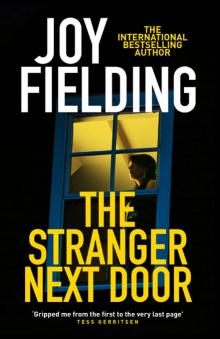 The Stranger Next Door
The Stranger Next Door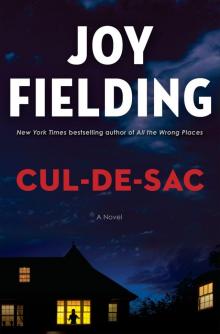 Cul-de-sac
Cul-de-sac The Final Act
The Final Act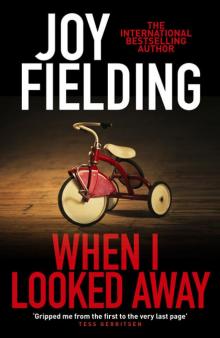 When I Looked Away
When I Looked Away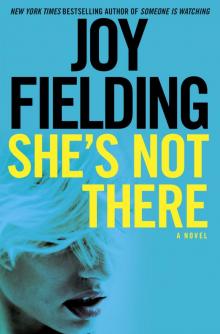 She's Not There
She's Not There All the Wrong Places
All the Wrong Places Now You See Her
Now You See Her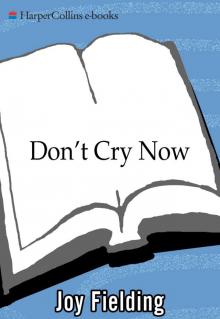 Don't Cry Now
Don't Cry Now Good Intentions
Good Intentions Still Life
Still Life Lost
Lost The First Time
The First Time Whispers and Lies
Whispers and Lies The Other Woman
The Other Woman Charley's Web
Charley's Web Mad River Road
Mad River Road Puppet
Puppet Life Penalty
Life Penalty The Wild Zone
The Wild Zone Home Invasion
Home Invasion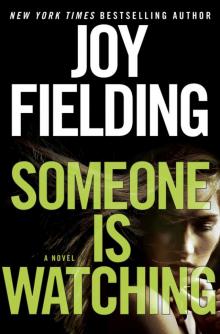 Someone Is Watching
Someone Is Watching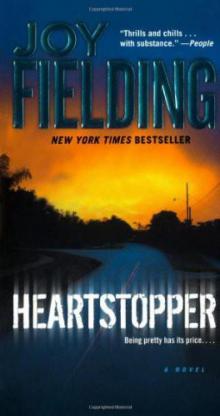 Heartstopper
Heartstopper See Jane Run
See Jane Run The Bad Daughter
The Bad Daughter Shadow Creek
Shadow Creek Missing Pieces
Missing Pieces Kiss Mommy Goodbye
Kiss Mommy Goodbye Grand Avenue
Grand Avenue